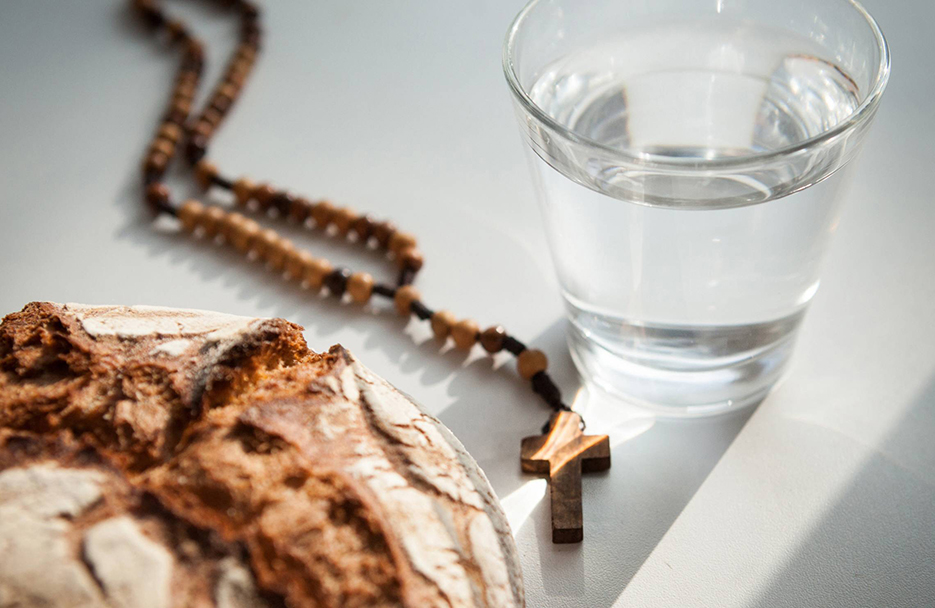Miguel Augusto
Fasting and penance are ways of purification, perfection, and spiritual combat. Jesus, when He let himself be led by the Spirit into the desert to face the temptation of the devil, shows us – gives us – one of the spiritual weapons He used to fight the devil: fasting. Already in the fourth century, St Peter Chrysologus wrote: “Fasting is the soul of prayer, mercy is the lifeblood of fasting. So, if you pray, fast; if you fast, show mercy.”
In Benedict XVI’s message for Lent 2009, the Holy Father stated that the Sacred Scriptures and the entire Christian tradition teach that fasting is a great help to avoid sin and all that leads to it. For this reason, the history of salvation is replete with occasions that invite fasting. The Pope Emeritus emphasized that fasting was very present in the first Christian community, and that “[t]he Church Fathers, too, speak of the force of fasting to bridle sin, especially the lusts of the ‘old Adam,’ and open in the heart of the believer a path to God. Moreover, fasting is a practice that is encountered frequently and recommended by the saints of every age.”
Seeing the need for mortification, St Teresa of Avila warned: “Our body has this defect that the more care and comfort it is given, the more needs and desires it encounters.”
In Matthew’s Gospel, Jesus makes clear the importance of the practice of fasting in parallel with prayer. He assumes that those who pray also fast. In His teaching, He teaches us that both – prayer and fasting – should be done in a discreet way, with humility, only seen by the eyes of God the Father. “When you pray, do not be like the hypocrites, who love to stand and pray in the synagogues and on street corners so that others may see them. Amen, I say to you, they have received their reward” (Matthew 6:5). In the same chapter, further on we read, “But when you fast, anoint your head and wash your face, so that you may not appear to be fasting, except to your Father who is hidden. And your Father who sees what is hidden will repay you” (Matthew 6:17-18).
Fasting is a way for each faithful to present himself or herself before God with humility and to overcome pride. It was through pride that the first couple, Adam and Eve, fell into sin, offending God. The Catechism of the Catholic Church (CCC) tells us that behind the disobedient choice of our first parents lurks a seductive voice, opposed to God, which makes them fall into death out of envy – “Scripture and the Church’s Tradition see in this being a fallen angel, called ‘Satan’ or the ‘devil’” (CCC 391).
By the practice of fasting, there are clearly innumerable spiritual benefits in its purpose and in spiritual combat. One of them is considered one of God’s ways of humbling ourselves before Him. Pride is considered the greatest barrier to obtaining an answer to prayer. St Luke the Evangelist, makes this reality clear to us in his gospel. “For everyone who exalts himself will be humbled, but the one who humbles himself will be exalted” (Luke 14:11).
Lucifer who was close to God, through pride rebelled against the Creator and condemned himself eternally. Jesus, on the contrary, being equal to the Father, humbled himself to death on the cross. As a consequence of this filial obedience, through suffering and redemptive humiliation, St Paul states “Because of this, God greatly exalted him and bestowed on him the name that is above every name” (Philippians 2:9).
The Jewish people, millennia before Christ, always knew that fasting, a practice since the time of Moses, was one of the ways they humbled themselves before the Lord.
Already in the Old Testament, God gave His people ways to be answered in their supplications: “And if my people, upon whom my name has been pronounced, humble themselves and pray, and seek my presence and turn from their evil ways, I will hear them from heaven and pardon their sins and revive their land” (2 Chronicles 7:14).
“Obligations” of Catholics
The Diocese of Macau explains the way of observing fasting and abstinence in its web page (see https://www.catholic.org.mo/en/page-53).
St Padre Pio said: “In suffering we are capable of giving something to God. The gift of pain, of suffering is a great thing and cannot be realized in Paradise.”
(Image: Fasting with bread and water, symbols of the Eucharist and Baptism)


 Follow
Follow


